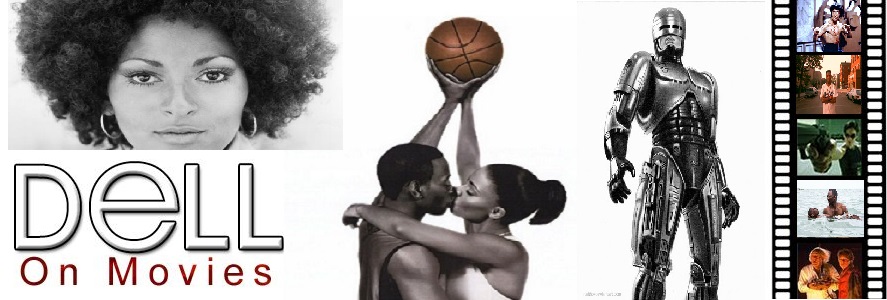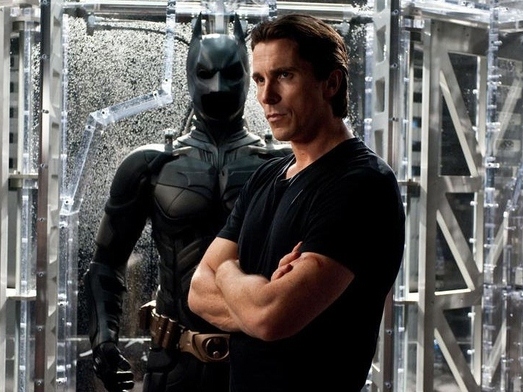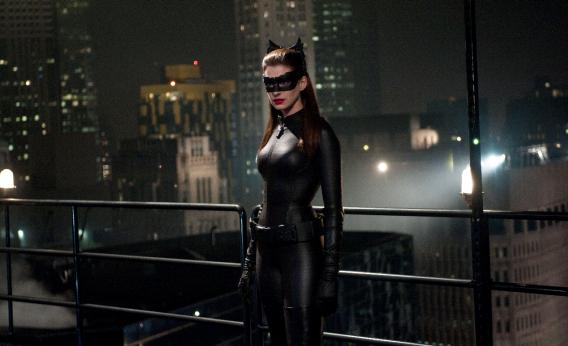Billionaire Bruce Wayne (
Bale) has retired from life just as his alter-ego,
Batman, has bowed out of the crime-fighting arena. For the last eight years he’s been a recluse, relegating himself to the east wing of Wayne Manor with no human contact other than his trusty butler Alfred (
Caine). It’s just as well since Batman is wanted for the murder of Harvey Dent. If this is a surprise to you, please watch both
Batman Begins and
The Dark Knight before reading any further. Anyhoo, the Caped Crusader is forced back into action when the mercenary known as Bane (Hardy) threatens to destroy Gotham City.
One of the things that happens to movie franchises is that by the third movie, the spectacle overwhelms the story. The scope expands beyond its breaking point. Throngs of new characters are introduced, convoluting an already weak tale. Special fx substitutes for substance. Often, all of this coincides with a shift in tone to make things overly
cartoonish. In short, the focus becomes being bigger than the previous movies, not continuing its saga.
The Dark Knight Rises falls victim to some of these things and manages to avoid others.
To help
TDKR stay above the fray littered with failed third installments is another splendid villain. A seemingly indomitable foe for our hero creates tension, keeps us on the edge of our seats. Bane gives us this, perhaps even more than
The Joker did in the last movie because, unlike the Clown Prince, we fear he is physically superior to Batman. This is in addition to possessing the same maniacal passion to blow Gotham to smithereens.
Tom Hardy gives us a menacing performance in the role, both aided and hindered by the mask that covers most of his face. With that and his bulky physique he’s simply intimidating to gaze upon. In action, he just as much, seeming to dwarf our hero in both height and width and the ability to put both to good use. The problem is the mask is equipped with a Vader-esque voice-box that lacks the clarity of having James Earl Jones voice the dialogue, occasionally making it difficult to understand what he’s saying.
As for
Batman himself, he’s ever the tortured soul. Life without his beloved Rachel (again, watch the first two movies) and also without the cape and cowl has proven to be a struggle. It’s the most interesting the character has been and Bale gives his best performance in the series. However, donning the costume again may not be the best thing for Bruce. It also strains his relationship with his oldest and best friend Alfred. Alfred wants nothing more for Bruce than a happy ending. He realizes this might be an unattainable goal. Michael Caine plays the role superbly. The most touching scenes in the film are of him pleading with Bruce to find a better way than constantly putting himself in harm’s way.
Alas, there is plenty of spectacle and a number of newcomers. Aside from Bane, the main newbies Selina Kyle AKA, but never actually called Catwoman (
Hathaway), Miranda Tate (
Cotillard) who may be able to save Wayne Enterprises from financial ruin and young police officer John Blake (
Gordon-Levitt). The handling of Selina Kyle is perhaps most interesting. She’s much less a villain than she is simply selfish and connected to all the wrong people. Unfortunately, the sparks needed to make some things towards the end work just aren’t there. Their relationship is much more reminiscent of a father and his adult daughter than two people sexually attracted to one another. Regardless of what she does dad, or Batman in this case, is there to show how much he believes in her. By itself that would be fine, but it renders the shift that takes place between them unbelievable and forced, even if predictable. When you add in all that’s going on with Wayne Enterprises’ board of directors, a romance with Miranda Tate, following around John Blake for long stretches and the movie can begin to feel a bit cluttered.
The spectacle is handled in magical fashion. The easiest thing to point out is Batman’s newest toy, an aircraft creator Lucius Fox (
Freeman) simply dubs The Bat. It’s an oddly shaped flying machine, but still more plausible than the giant flying aircraft carrier in
The Avengers. Whenever it appears it takes center stage. However, the eye-popper is Gotham herself. One of the greatest strengths of Nolan’s trilogy is making the city a living, breathing character. She is Bruce Wayne’s true love. She is our damsel in distress. The cinematography exploring, exploiting and damaging her is amazing.
Though very exciting and containing most of the action, the last third of
TDKR is a point of contention with me. Timelines become incoherent, plotholes pop up in droves and the last minute or two feels like a bit of a copout. This is completely understandable since
TDKR is intended to be the last Batman movie Nolan will helm. I don’t think he wanted to upset too many folks on his way out the door. However, the previous movie in the franchise, along with his other movies like
Memento and
Inception, proves that he’s willing to end on a surprising and disconcerting note. For the first time in the trilogy, the director flinches. He shies away from challenging us and is content with merely entertaining us. This is all fine and dandy, but the finale doesn’t leave the lasting impression of its predecessor.
















